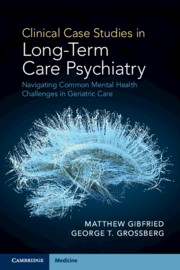 Clinical Case Studies in Long-Term Care Psychiatry
Clinical Case Studies in Long-Term Care Psychiatry Book contents
- Clinical Case Studies in Long-Term Care Psychiatry
- Clinical Case Studies in Long-Term Care Psychiatry
- Copyright page
- Contents
- Preface
- Section 1 Neurocognitive Disorders
- Case 2 “I Think I Hit My Head”
- Case 3 “It’s like She’s a Different Person”
- Case 4 “I Am Tired All the Time”
- Case 5 “I Am Okay”
- Case 6 “Leave Me Alone”
- Case 7 “I Am Fine”
- Case 8 “Those Children Are Cute”
- Case 9 “Those Terrible Men Have Left”
- Case 10 “I Saw the Heavenly Gates”
- Case 11 “Leave Me Alone”
- Section 2 Mood Disorders
- Case 13 “My Mom Looks Like a Zombie!”
- Case 14 “My Soul Is in England”
- Case 15 “I Feel Terrible”
- Case 16 “I Don’t Care”
- Case 17 “I Feel Very Lonely”
- Case 18 “I Don’t Feel Right”
- Case 19 “I Am Feeling Great”
- Case 20 “I Am Staying Here Illegally”
- Section 3 Psychotic Disorders
- Case 22 “He Just Won’t Get Up”
- Case 23 “My Body Is Being Taken over by a Fungus!”
- Case 24 “This Is Humiliating”
- Case 25 “I Want to Go Home”
- Case 26 “I Am a Worrier”
- Case 27 “Get out of My House”
- Section 4 Anxiety and Related Disorders
- Case 29 “My Vision Has Been Worsening in the Last Two Weeks”
- Case 30 “I Am Not Addicted to Valium”
- Case 31 “Of Course, I Worry about Him”
- Case 32 “Bombs Are Falling! Run, Run!”
- Section 5 Substance Abuse Disorders
- Section 6 Personality Disorders
- Case 35 “I Cannot Wait to Get out of This Miserable Place”
- Section 7 Miscellaneous Neuropsychiatric Disorders Affecting Patients in Long-Term Care
- Case 37 “Everyone Is Just So Good to Me!”
- Case 38 “Why Do They Say I Have Dementia?”
- Case 39 “I Hate That Guy … I Can’t Get Any Sleep!”
- Case 40 “Just One Kiss”
- Case 41 “I Don’t Feel Well”
- Case 42 “I Like Food”
- Case 43 “I Like the Way She Laughs”
- Case 44 “This Is So Hard”
- Index
- References
Case 35 - “I Cannot Wait to Get out of This Miserable Place”
Borderline Personality Disorder
Published online by Cambridge University Press: 31 October 2024
- Clinical Case Studies in Long-Term Care Psychiatry
- Clinical Case Studies in Long-Term Care Psychiatry
- Copyright page
- Contents
- Preface
- Section 1 Neurocognitive Disorders
- Case 2 “I Think I Hit My Head”
- Case 3 “It’s like She’s a Different Person”
- Case 4 “I Am Tired All the Time”
- Case 5 “I Am Okay”
- Case 6 “Leave Me Alone”
- Case 7 “I Am Fine”
- Case 8 “Those Children Are Cute”
- Case 9 “Those Terrible Men Have Left”
- Case 10 “I Saw the Heavenly Gates”
- Case 11 “Leave Me Alone”
- Section 2 Mood Disorders
- Case 13 “My Mom Looks Like a Zombie!”
- Case 14 “My Soul Is in England”
- Case 15 “I Feel Terrible”
- Case 16 “I Don’t Care”
- Case 17 “I Feel Very Lonely”
- Case 18 “I Don’t Feel Right”
- Case 19 “I Am Feeling Great”
- Case 20 “I Am Staying Here Illegally”
- Section 3 Psychotic Disorders
- Case 22 “He Just Won’t Get Up”
- Case 23 “My Body Is Being Taken over by a Fungus!”
- Case 24 “This Is Humiliating”
- Case 25 “I Want to Go Home”
- Case 26 “I Am a Worrier”
- Case 27 “Get out of My House”
- Section 4 Anxiety and Related Disorders
- Case 29 “My Vision Has Been Worsening in the Last Two Weeks”
- Case 30 “I Am Not Addicted to Valium”
- Case 31 “Of Course, I Worry about Him”
- Case 32 “Bombs Are Falling! Run, Run!”
- Section 5 Substance Abuse Disorders
- Section 6 Personality Disorders
- Case 35 “I Cannot Wait to Get out of This Miserable Place”
- Section 7 Miscellaneous Neuropsychiatric Disorders Affecting Patients in Long-Term Care
- Case 37 “Everyone Is Just So Good to Me!”
- Case 38 “Why Do They Say I Have Dementia?”
- Case 39 “I Hate That Guy … I Can’t Get Any Sleep!”
- Case 40 “Just One Kiss”
- Case 41 “I Don’t Feel Well”
- Case 42 “I Like Food”
- Case 43 “I Like the Way She Laughs”
- Case 44 “This Is So Hard”
- Index
- References
Summary
Borderline personality disorder is a complex mental health condition. Those with the condition have unstable moods, a history of difficulty functioning in relationships, and a dysfunctional self-image. Patients have emotional dysregulation that can lead to impulsive behaviors, self-harm, and fear of abandonment and have significant challenges in life that can lead to poor psychosocial outcomes. Interpersonal relationships can often be intense and dysfunctional and demonstrate frequent conflicts. Emotional dysregulation can lead to rapid and intense mood swings. Impulsivity can lead to issues such as reckless spending, risky sexual behaviors, and substance abuse. The treatment of borderline personality disorder is largely through long-term psychological therapy and the gold standard therapy approach is dialectical behavior therapy. This therapy focuses on optimizing emotional regulation, distress tolerance, interpersonal effectiveness, and mindfulness skills.
- Type
- Chapter
- Information
- Clinical Case Studies in Long-Term Care PsychiatryNavigating Common Mental Health Challenges in Geriatric Care, pp. 178 - 182Publisher: Cambridge University PressPrint publication year: 2024
